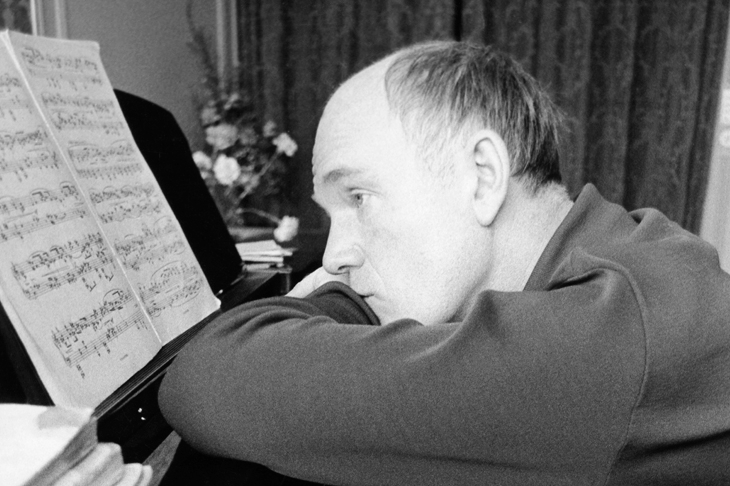I’m unlucky with Beethoven’s Appassionata Sonata. Twice in the past year I’ve bolted for the exit as soon the pianist crossed the finishing line.
The first performance was phoned in to the Royal Festival Hall by a washed-out Maurizio Pollini. The second was musical chloroform, so dreary that it would be cruel to name the perpetrator. Cruel but fair, since I paid 30 quid for the ticket: Piers Lane. Fortunately he’d programmed it before the interval. By the time he’d moved on to Chopin I was back home listening to an Appassionata from another planet — simultaneously thoughtful and daring, the finale taken at such a perilous speed that it’s a miracle it didn’t come off the rails.
The venue was Carnegie Hall, the year 1960. Music buffs will guess that the pianist was the young but already legendary Sviatoslav Richter. American audiences couldn’t believe their ears. Richter’s touch combined feather and steel; however fast he played, he was chiefly interested in revealing the deep foundations of the music — or, depending on your point of view, imposing his own peculiar structure on it. He created moods that critics struggled to capture: a Google search of reviews yields ‘manic nonchalance’ and ‘restless despair’. That sounds very Russian, but Richter was never a Soviet pianist in the mould of his great contemporary Emil Gilels, whose double octaves sound as if they were intended to boost morale in a tractor factory.
Richter’s only true rival was Vladimir Horowitz. On the face of it, the two had nothing in common — apart from concealing their homosexuality, something that came more naturally to the frowning mystic than to the bow-tied schmaltz merchant. It’s hard to imagine Horowitz breaking a finger in a brawl with a sailor at a railway station, as Richter did in 1952. But both men had a command of colour that matched their fingerwork — and was sometimes undermined by risk-taking. Their transcendental but unreliable techniques kept audiences on the edge of their seats, and not always for the right reason. For example, that frenzied coda of Richter’s Carnegie Hall Appassionata is marred by a horribly intrusive wrong note. There are other Richter recordings of the same piece in better sound — but they aren’t nearly as electrifying, so you just have to put up with it.
Alternatively, you may decide that Richter is just too perverse and opt for someone safer. Murray Perahia, for example, though even this most tasteful of artists can go to pieces on the platform. After a concert in Moscow in the 1980s, one critic wrote: ‘What happened? A terrible attack of nerves? This famous pianist played virtually everything badly and his Chopin left me cold.’
The critic was Sviatoslav Richter, who took notes on almost every piece of live and recorded music he heard from 1970 to 1995, including radio broadcasts on car journeys. They weren’t private, because at the end of his life he handed them over to Bruno Monsaingeon for a book accompanying his famous Richter documentary. To my shame, I’ve only just discovered them. In his introduction, Monsaingeon says he ‘felt obliged to leave out entries that might be considered ad hominem attacks on living people’. They’ll make interesting reading one day, judging by what he left in.
Here’s Richter on Pollini: ‘Chopin cast in metal’ and ‘lacking in any kind of charm, dressed up in the latest fashion as though on purpose.’ On Radu Lupu: ‘Everything is so carefully calculated and weighed up in advance that there’s nothing unexpected or surprising.’ Vladimir Ashkenazy: ‘Expression = zero. Nothing happens.’ (There’s also a comment about Jessye Norman’s physique that I’ll pass over because she’s been known to sue at the slightest mention of it.)
On the whole, however, there’s more mischief than rancour in these notebooks. Richter adores Andrei Gavrilov’s playing despite its carelessness, and relishes his vanity: ‘Each time he takes someone in his luxury car he inflicts his own recording of the Tchaikovsky Concerto on them (excellent though it is).’ He is thrilled by Zoltan Kocsis — awful to think he’s no longer with us — and he says something very prescient about Evgeny Kissin: ‘He never throws himself headlong into the sea. Perhaps he’ll never do so.’
Only one pianist is routinely trashed: ‘shameful blemishes… a catastrophe… better if this had never seen the light of day’, and so on. Richter is writing about himself. And some of his criticisms are valid: trying to catch the maestro at his best is as frustrating now, when we have only his recordings, as it was when he was alive. Still, there is no one of comparable stature playing today. It makes me sick to my stomach to think that I could have heard him in the flesh but — stumbling in and out of pubs in a spirit of manic nonchalance — just couldn’t be bothered.







Comments